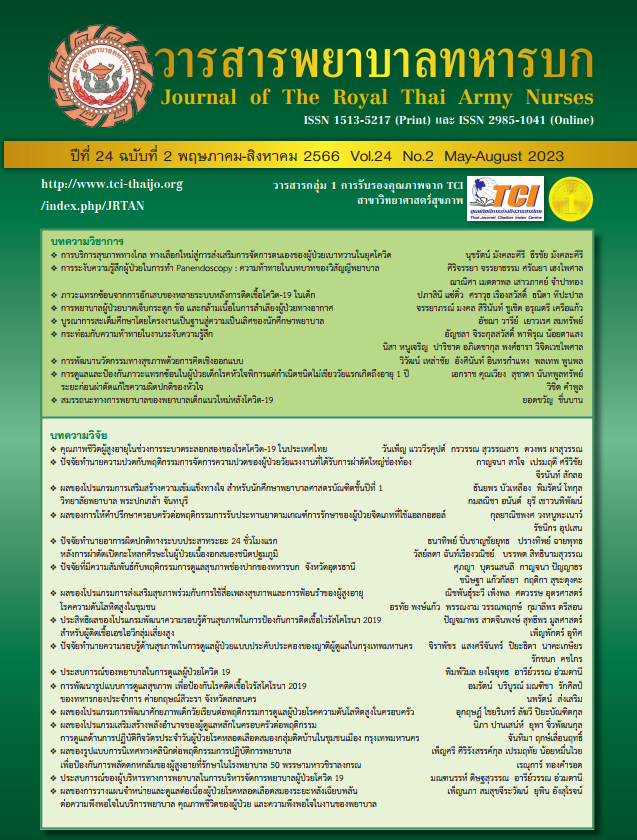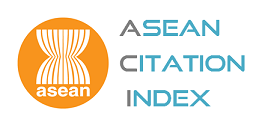การเสริมสร้างการกำกับอารมณ์ของนักเรียนวัยรุ่นที่ถูกรังแก บนโลกไซเบอร์ด้วยการปรึกษากลุ่มทฤษฎีเน้นทางออกระยะสั้น
คำสำคัญ:
กำกับอารมณ์, การปรึกษากลุ่มทฤษฎีเน้นทางออกระยะสั้น, การรังแกบนโลกไซเบอร์, นักเรียนวัยรุ่นบทคัดย่อ
การศึกษาครั้งนี้มีวัตถุประสงค์เพื่อศึกษาผลการเสริมสร้างการกำกับอารมณ์ของนักเรียนวัยรุ่นที่ถูกรังแกบนโลกไซเบอร์ ด้วยการปรึกษากลุ่มทฤษฎีเน้นทางออกระยะสั้น เป็นการวิจัยกึ่งทดลอง กลุ่มตัวอย่าง คือ วัยรุ่นอายุ 18 ปีขึ้นไป ในโรงเรียนแห่ง หนึ่ง เขตกรุงเทพมหานคร จำนวน 16 คน ที่เคยมีประสบการณ์การถูกรังแกบนโลกไซเบอร์ แบ่งเป็น 2 กลุ่ม คือ กลุ่มทดลอง 8 คน และกลุ่มควบคุม 8 คน เครื่องมือที่ใช้ คือ แบบวัดการกำกับอารมณ์ของวัยรุ่น จำานวน 40 ข้อ มีค่า IOC = .89 และโปรแกรมการ ปรึกษากลุ่มทฤษฎีเน้นทางออกระยะสั้น 6 ครั้ง มีค่า CVI = .90 สถิติที่ใช้ในการวิเคราะห์ข้อมูล คือ ร้อยละ ค่าเฉลี่ย ค่าเบี่ยงเบน มาตรฐาน ทดสอบสมมติฐานโดยสถิติไร้พารามิเตอร์ Mann-Whitney U test และ The Wilcoxon Signed-Ranks Test ผลการ วิจัยพบว่า 1) กลุ่มทดลองที่ได้รับการปรึกษากลุ่มมีคะแนนการกำกับอารมณ์ในระยะหลังทดลอง และระยะติดตามผลสูงกว่ากลุ่ม ควบคุมอย่างมีนัยสำคัญทางสถิติที่ระดับ .05 2) กลุ่มทดลองที่ได้รับการปรึกษากลุ่มมีคะแนนการกำกับอารมณ์ในระยะหลังทดลอง สูงกว่าก่อนทดลองอย่างมีนัยสำคัญทางสถิติที่ระดับ.05 และ 3) กลุ่มทดลองที่ได้รับการปรึกษากลุ่มมีคะแนนการกำกับอารมณ์ใน ระยะติดตามผลสูงกว่าก่อนทดลองอย่างมีนัยสำคัญทางสถิติที่ระดับ.05
Downloads
เอกสารอ้างอิง
Chainwong P., Sakulpan S., Tabinta D. Being Cyberbullied and Suicide risk among youths. Psychiatric Nurse Association of Thailand. 2020; 34(3) : 133-51. (in thai)
Kowalski R. M., Giumetti G. W., Schroeder A. N., & Lattanner M. R. Bullying in the digital age: A critical review and meta-analysis of cyberbullying research among youth. Psychological Bulletin. 2014; 140(4): 1073-137.
Tudkuea T., Laheem K., Sittichai R. Guidelines for Preventive Cyber Bullying Behaviors among Secondary School Students in the Three Southern Border Provinces. Journal of Behavioral Science for Development. 2019; 11(1): 91–106. (in thai)
Bergins C.C., Bergins D.A. Child and adolescent development in your classroom. 2nd ed. Belmont CA: Wadsworth Cengage Learning; 2014.
Wanthaneekun T., Kulnapadol P. The Effect of Individual Solution Focus Brief Therapy on Emotion Regulation of Adolescent Mothers. Research Methodology & Cognitive Science. 2015; 13(1): 18-26. (in thai)
Mukdee S., Srikhruedong S., Kongsuriyanawin W. Development of a Self-Regulation Program Based on the Concept of Buddhist Psychology for Nursing Students at Kuakarun Faculty of Nursing, Navamindradhiraj University. Journal of Royal Thai Army Nurses. 2017; 18(1): 46-55. (in thai)
Corey g. Theory and practice of group counseling. 8th ed. Belmont CA: Brooks/Cole; 2012.
Koolnaphadol P. Family Counseling. 2nd ed. Chachoengsao: Ham compute offset; 2017. (in thai)
Gross J.J., John O.P. Individual differences in two emotion regulation processes: Implications for affect, relationships, and well-being. Journal of Personality and Social Psychology, 2003; 85(1): 348-62.
Gratz K. L., & Roemer L. Multidimensional assessment of emotion regulation and dysregulation: Development, factor structure, and initial validation of the difficulties in emotion regulation scale. Journal of Psychopathology and Behavioral Assessment. 2004; 26(1): 41–54.
Garnefski N, Kraaij V, Van Etten M. Specificity of relations between adolescents’ cognitive emotion regulation strategies and Internalizing and Externalizing psychopathology. Journal of Adolescence. 2005; 28(5): 619-31.
Linton, J. M., Bischof, G. H., & McDonnell, K. A. Solution-oriented treatment groups for assaultive behavior. Journal for Specialists in Group Work. 2005; 30(1): 5-22.
Thompson, Rosemary A. Counseling Techniques Improving Relationships with Others Ourselves, our Families, and our Environment. 4thed. Philadelphia: Taylor & Francis; 2003.
Corey, M. S., Corey, G., & Corey, C. Groups process and practice. 9th ed. Australia: Brooks Cole Cengage Learning; 2014.
Hicks, J. G. F., Skoog, S., & Crews, C. Empowering Cyberbullied Youth: A Solution-Focused Adlerian Counseling Model. Proceedings of the American Counseling Association Conference and Expo, March 27–30, 2014, Honolulu, HI: Vistas; 2015.
Kwamkanung J., Kaewchinda M. Group counseling with Stabilization techniques to enchance coping skills for Cyberbullied youth. Journal of Graduate Studies Valaya Alongkron Rajabhat University. 2016; 10(2): 40-52. (in thai)
Boonboot K, Koolnaphadol P, Inang P. The Enhancement of Adolescent Student’s Growth Mindset Through Integrated Group Counseling Program with Cognitive Behavioral Theory and Cognitive Group Activities. Journal of The Royal Thai Army Nurses. 2022; 23(2): 372-80. (in thai)
Chaleoykitti S., Wongpanarak N. Family Therapy: Counseling and Empowerment of positive thinking in family. Journal of The Royal Thai Army Nurses. 2015; 16(1): 14-21. (in thai)
ดาวน์โหลด
เผยแพร่แล้ว
รูปแบบการอ้างอิง
ฉบับ
ประเภทบทความ
สัญญาอนุญาต
ลิขสิทธิ์ (c) 2023 วารสารพยาบาลทหารบก

อนุญาตภายใต้เงื่อนไข Creative Commons Attribution-NonCommercial-NoDerivatives 4.0 International License.
บทความหรือข้อคิดเห็นใดใดที่ปรากฏในวารสารพยาบาลทหารบกเป็นวรรณกรรมของผู้เขียน ซึ่งบรรณาธิการหรือสมาคมพยาบาลทหารบก ไม่จำเป็นต้องเห็นด้วย
บทความที่ได้รับการตีพิมพ์เป็นลิขสิทธิ์ของวารสารพยาบาลทหารบก
The ideas and opinions expressed in the Journal of The Royal Thai Army Nurses are those of the authors and not necessarily those
of the editor or Royal Thai Army Nurses Association.







